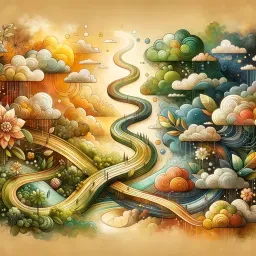”Venture outside your comfort zone.
The rewards are worth it“

0
0
0
0
- Meaning
- The phrase captures a fundamental truth about the human experience: comfort can often lead to stagnation. Philosophically, it aligns with existential and growth theories, where the discomfort faced in new experiences can lead to a deeper understanding of oneself and the world. Psychologically, it resonates with concepts of resilience and the idea that one must face fears to cultivate growth. Historically, many figures have articulated similar sentiments, advocating that change and success come from embracing discomfort and challenges.
- Allegory
- In the allegorical image, the individual at the edge represents the choice to confront their comfort zone. The tranquil landscape signifies safety and familiarity, while the vibrant territory ahead symbolizes opportunity and the unknown. The blooming flowers along the pathway symbolize growth, resilience, and the beauty found in exploration. The bright horizon evokes feelings of hope and potential, reinforcing the notion that rewards await those who dare to step beyond safe boundaries.
- Applicability
- This phrase can be applied in personal life by encouraging individuals to take risks in different areas—for instance, trying new activities, meeting new people, or pursuing that project or job that seems daunting. By embracing challenges, individuals can discover new strengths and achieve personal milestones that once seemed out of reach.
- Impact
- The impact of this phrase is seen widely in self-help literature, motivational speaking, and personal development seminars. It has inspired movements encouraging people to step out and engage with life more fully, impacting how individuals approach personal challenges and career growth.
- Historical Context
- While the exact historical context cannot be pinpointed, the concept of venturing outside one's comfort zone gained prominence in late 20th-century personal development movements, coinciding with rising interest in psychology and self-help literature.
- Criticisms
- Some criticisms of this phrase argue that it may lead to unnecessary risk-taking without considering one's limits or context. Critics might assert that comfort zones can also provide necessary stability, and not all discomfort leads to growth. Arguments against extreme interpretations emphasize the need for balance in challenging oneself.
- Variations
- Variations of this phrase appear in various cultures. For example, in Eastern philosophies, a similar concept can be found in the idea of 'no gain without pain.' Across cultures, the interpretation often underlines the value of embracing discomfort as a necessary part of personal development, although the emphasis might differ based on cultural values of risk and security.
-

I’m trash!
-

You were my new dream.
-

It’s called love. It’s why we do it.
-

I think it’s time for a new adventure.
-

You’re never too old to be young.
-

Always be yourself. Unless you can be Batman, then always be Batman.
-

The very things that hold you down are going to lift you up.
-

You’re gonna see it’s our destiny.
-

There’s magic in the air tonight, and anything can happen.
-

Take her to the moon for me.
-

There are no accidents.
-

You don’t have to be perfect to be amazing.
No Comments